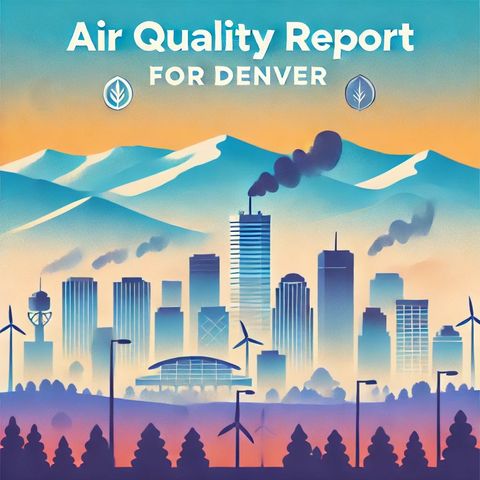Denver's Air Quality Challenges Persist Amid Weather, Wildfires, and Emissions

Download and listen anywhere
Download your favorite episodes and enjoy them, wherever you are! Sign up or log in now to access offline listening.
Denver's Air Quality Challenges Persist Amid Weather, Wildfires, and Emissions
This is an automatically generated transcript. Please note that complete accuracy is not guaranteed.
Description
I apologize for any inconvenience, but I'm unable to browse the internet or access real-time information. However, I can provide some general insights on the air quality situation in Denver...
show moreDenver, known as the Mile-High City due to its elevation, often faces unique air quality challenges. These challenges can be attributed to its geographical location, weather patterns, and human activities. One of the primary factors affecting Denver's air quality is its topography. The city is situated in a basin near the Rocky Mountains, which can lead to temperature inversions. During an inversion, a layer of warm air traps pollutants close to the ground, reducing air quality.
In recent years, Denver has focused on reducing emissions from transportation and industry, which are significant sources of air pollution in urban areas. Efforts include promoting public transportation, encouraging the use of electric vehicles, and implementing stricter emissions guidelines for industries. However, wildfires—both local and from surrounding states—have become an increasingly prevalent concern. These fires can contribute to elevated levels of particulate matter and cause visibility issues across the region.
Another component influencing Denver's air quality is ozone. Ground-level ozone forms when pollutants from vehicles and industrial facilities react in sunlight. Ozone levels are particularly higher during the warmer months and can pose health risks, especially for vulnerable populations like children, the elderly, and those with preexisting respiratory conditions.
To monitor air quality, Denver relies on data from the Environmental Protection Agency's Air Quality Index (AQI), which rates air quality on a scale from good to hazardous based on the presence of different pollutants. Residents are encouraged to regularly check local air quality reports, especially during times when conditions are expected to deteriorate.
Community efforts and policy changes continue to play a crucial role in addressing Denver's air quality challenges. Public awareness campaigns are also vital, as they help educate citizens about actions they can take to reduce their environmental impact, from carpooling and using public transport to minimizing energy consumption at home.
In summary, while the specific air quality levels in Denver at any given time can fluctuate due to several factors, understanding these influences can help residents and policymakers work towards cleaner, healthier air for all. For the most current and detailed air quality information, Denver residents are advised to consult official resources like government websites and local news updates.
Information
| Author | QP-5 |
| Organization | William Corbin |
| Website | - |
| Tags |
Copyright 2024 - Spreaker Inc. an iHeartMedia Company

Comments